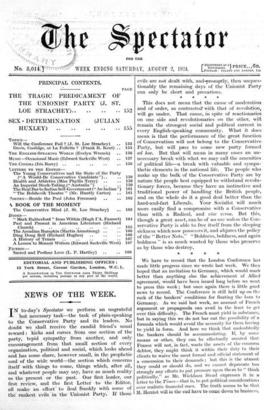We have to record that the London Conference has made
little progress since we wrote last week. We then hoped that an invitation to Germany, which would mark better than ...anything else the achievement of Allied agreement, would have been issued long before we went to press this week ; but once again there is little good news to record. The C,onferende is still held up on the rock of the bahkers' conditions for floating the loan to Germany. As we said last week, no amount of French argument or propaganda can avail in the least to get over this difficulty. The French must yield in substance, but in saying this we do not bar out the possibility of a formula which would avoid the necessity for them having to yield in form. And here we think that undoubtedly the bankers should be accommodating. If, by some means or other, they can be effectually assured that France will not, in fact, waste the assets of the common debtor, they might think it within their duty to their clients to waive the most formal and official statement of a concession to their demands ; but this is the utmost they could or should do, and we cannot deprecate too strongly any efforts to put pressure upon them to " think politically," as Mr.- Wickham Stead expresses it in a letter to the Times—that is, to put political considerations over realistic financial ones. The truth seems to be that M. Herriot will in the end have to come down to business, and this because the awful results to France of a breakdown of the Conference are becoming realized.



































